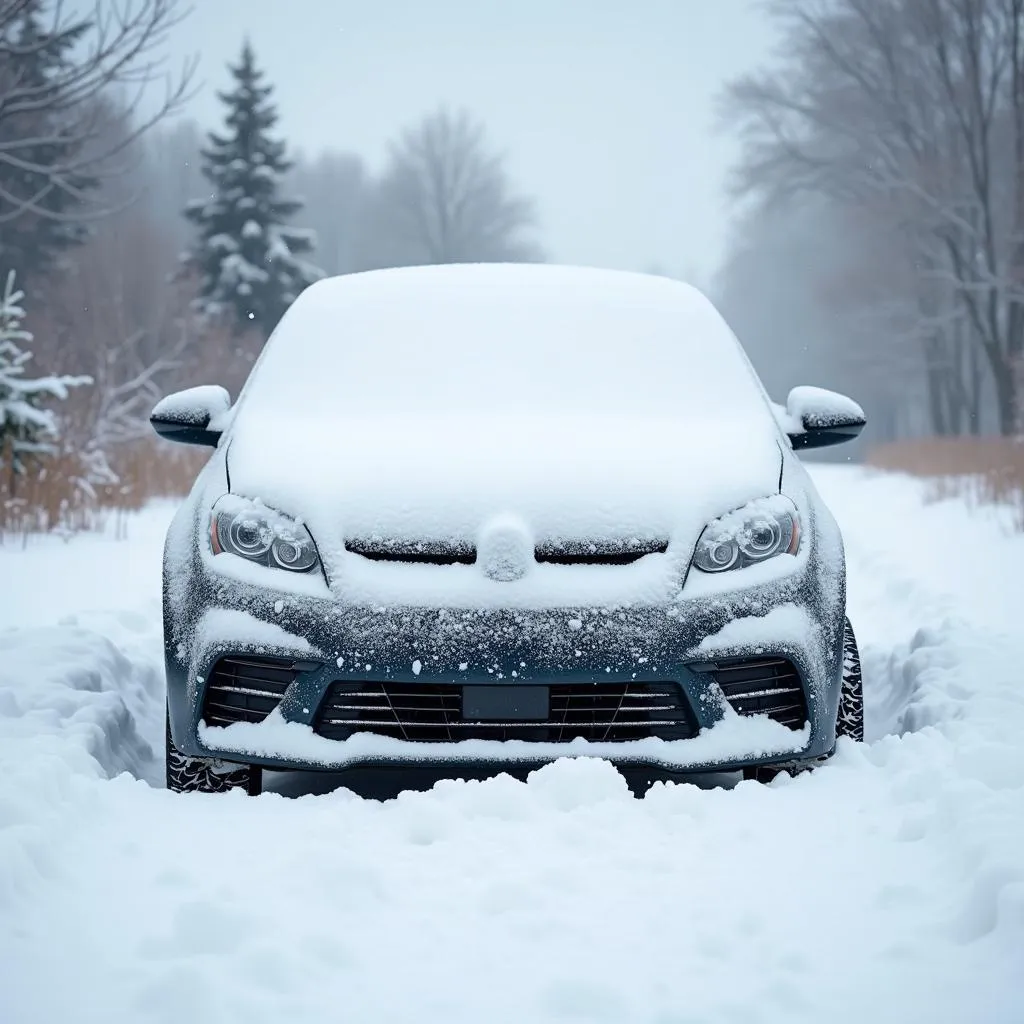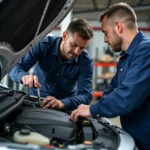Winter’s icy breath brings with it unique challenges for your vehicle. Don’t let the cold catch you off guard! Preparing your car for winter ensures optimal performance, safety, and longevity. Taking proactive steps now can save you from costly repairs and headaches down the road.
Why is Car Service Before Winter Crucial?
Just like you wouldn’t brave a blizzard in shorts and sandals, your car needs the right gear to handle winter’s extremes. Cold temperatures, snow, ice, and road salt can wreak havoc on your vehicle’s systems, leading to:
- Reduced Battery Life: Cold weather zaps battery power, making jumpstarts a common winter woe.
- Thickened Fluids: Engine oil, transmission fluid, and coolant thicken in cold temperatures, hindering optimal performance.
- Weakened Belts and Hoses: Freezing temperatures can make belts and hoses brittle, leading to cracks and breaks.
- Compromised Visibility: Fog, frost, and shorter daylight hours demand a fully functioning defroster, heater, and wipers.
Essential Car Service Checks Before Winter Arrives
A comprehensive car service before winter encompasses a range of checks and maintenance tasks to ensure your vehicle is ready for anything.
1. Battery Check and Maintenance
Your battery is your car’s lifeline, especially during winter. Have a mechanic test your battery’s voltage and charging system to ensure it’s in top shape. Consider replacing an aging battery to avoid unexpected breakdowns.
2. Fluid Level and Condition Inspection
Maintaining proper fluid levels and condition is paramount in winter. Have your mechanic inspect and top off:
- Engine Oil: Opt for a winter-grade oil recommended for your vehicle’s make and model.
- Coolant: Ensure your coolant mixture is appropriate for your region’s freezing temperatures.
- Transmission Fluid: Check the fluid level and condition for smooth gear shifting.
- Brake Fluid: Moisture in brake fluid can freeze and impact braking performance.
- Windshield Washer Fluid: Use a winter-specific formula that won’t freeze in sub-zero temperatures.
3. Tire Inspection and Maintenance
Your tires are your only point of contact with the road, making their condition critical for winter driving safety.
- Tread Depth: Adequate tread depth is crucial for gripping snow and ice. Consider winter tires if you live in an area with heavy snowfall.
- Tire Pressure: Cold weather causes tire pressure to drop. Check and inflate tires to the recommended pressure listed in your owner’s manual.
- Tire Rotation: Rotating your tires ensures even wear and tear, extending their lifespan.
4. Brakes Inspection and Service
Winter driving often involves sudden stops and slippery conditions, putting extra stress on your brakes.
- Brake Pad and Rotor Check: Have your mechanic check your brake pads and rotors for wear and tear.
- Brake Fluid Flush: Flush and replace old brake fluid to maintain optimal braking performance.
5. Heating and Defrosting System Check
A clear windshield and a warm cabin are essential for comfort and visibility during winter.
- Heater Core: Ensure your heater core is functioning correctly to provide ample heat.
- Defroster: Check that the front and rear defrosters are working efficiently.
- Wiper Blades: Replace worn wiper blades with winter blades designed to handle ice and snow buildup.
6. Lights and Electrical System Check
Shorter daylight hours and adverse weather conditions make a well-functioning lighting system critical for winter driving safety.
- Headlights, Taillights, Brake Lights: Check all lights for proper operation and replace any burnt-out bulbs.
- Battery and Alternator: Ensure your battery and alternator are in good condition to power your electrical system.
7. Belts and Hoses Inspection
Cold temperatures can weaken belts and hoses, making them more susceptible to cracks and breaks.
- Inspect Belts for Cracks or Fraying: Replace any worn belts to prevent unexpected failures.
- Check Hoses for Leaks or Soft Spots: Replace any damaged hoses to prevent leaks and potential engine damage.
Expert Insights:
“Don’t wait for the first snowflake to fall before thinking about winter car care,” advises Master Mechanic, John Smith of Smith’s Auto Repair. “Proactive maintenance is key to preventing winter breakdowns and ensuring your car is ready to tackle whatever Mother Nature throws its way.”
He adds, “Many car owners overlook the importance of battery maintenance. Remember, a battery’s lifespan is significantly reduced in cold weather. Getting your battery tested and replaced if needed is a small investment that can save you a lot of hassle down the road.”
Conclusion
Taking the time to get your car serviced before winter arrives is an investment in your safety, peace of mind, and the longevity of your vehicle. By addressing potential issues before they become major problems, you can enjoy worry-free winter driving. Schedule an appointment with your trusted mechanic today and ensure your car is ready for the cold months ahead.



